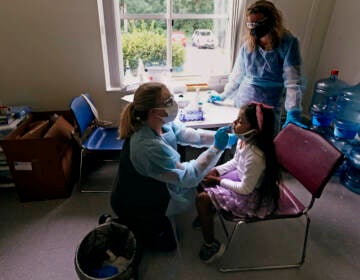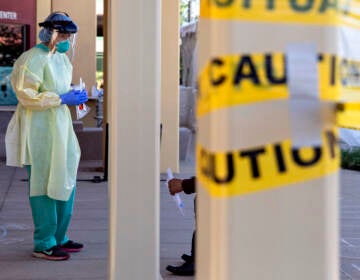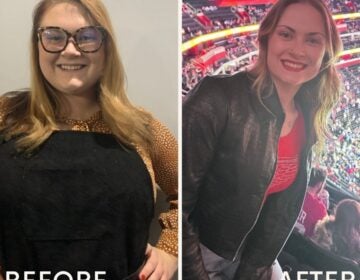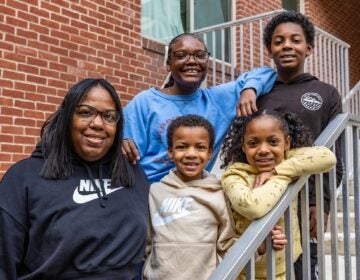The pandemic has worsened poverty’s effects on childhood obesity, report says
About 1 American child in 6 experiences obesity, says a new report from the Robert Wood Johnson Foundation. Deepening poverty has a big impact.

The cookie aisle in a grocery store. (Big Stock)
Ask us about COVID-19: What questions do you have about the coronavirus and vaccines?
About one American child in six experiences obesity, according to a new State of Childhood Obesity report from the Robert Wood Johnson Foundation.
Of young people ages 10 to 17, 16.2% nationwide are affected by obesity, and the numbers are greater among children of color and children from economically disadvantaged families, according to the report. Obesity rates were highest for American Indian/Alaska Native adolescents (29%), followed by Black (24%), Hispanic (21%), white (12%), and Asian adolescents (8%).
More than 23% of children from households with the lowest income levels experience childhood obesity, compared to 8.6% of children from households with the highest income levels.
The report attributes many of the causes of childhood obesity to social determinants of health.
“We historically had really focused on healthy eating and physical activity,” said Jamie Bussel, a senior program officer for the foundation. “Those are really, really important. But as important is whether or not that child has a safe place to call home. Does mom or dad or that care provider have a stable income? Is there reliable transportation? Is there access to high quality health care, access to healthy food? So all of those factors influence the child and the family’s opportunities to live well, be healthy, and be at a healthy weight.”
Experts say many of those factors were exacerbated by the pandemic. Families that were already dealing with financial challenges were increasingly burdened in every aspect of their lives — housing, education, health care, food insecurity, and job security.
Dr. Stephanie Tanner Walsh, a pediatrician at Crozer Health in Chester, Pennsylvania, said the pandemic has had a deep impact on families in her community, which has a history of high poverty and food insecurity.
“Our school district was hit very hard, and most of these kids were out of school from March 2020 to September 2021, and the majority of those children were receiving school meals. Their parents often had jobs that did not allow them to telework, and child care centers were shut down, so these kids were left to their own devices for food while also having their usual recreational activities taken away,” she said.
The Robert Wood Johnson Foundation report also names structural racism as a contributor to childhood obesity and health care inequality, as it affects housing, school options, and access to health care and food.
“If we don’t get at this sort of fundamental kind of structural racism, we’re not going to make progress on health equity in America,” said Bussel. “And we’re certainly not going to make progress on addressing childhood obesity.”
Walsh said that health care professionals at Crozer are seeing major weight gain over short periods in many of their young patients, with some gaining 60 pounds over the course of a year. She said obesity leads to increases in the number of children diagnosed with Type 2 diabetes, fatty liver, and cholesterol and blood pressure issues, as well as impact on their mental health and self-esteem. Children who experience obesity are suddenly faced with getting everything under control.
“If you’re 13 years old and you have Type 2 diabetes, you’re not even an adult yet,” she said.
Childhood obesity is driven by these systemic and interconnected factors, and the policies the foundation recommends are just as broad and systems-based. The recommendations are focused on the community and include making free Universal School Program meals permanent, expanding policies that pull families out of poverty and reduce food insecurity, and extending supplemental nutrition programs for mothers to the first two years after the birth of their children.
Walsh urged return visits to the community pediatrician, who is prepared to handle everything from mental health and obesity to how kids are doing in school and their self-esteem.
“A lot of the kids have missed their wellness visits since 2019 and haven’t been talking to their doctors about what can be done. Some people simply do not know what to do, and missing this conversation is really hurting them. Pediatricians can help parents figure out how to help their child,” she said.

Get daily updates from WHYY News!
WHYY is your source for fact-based, in-depth journalism and information. As a nonprofit organization, we rely on financial support from readers like you. Please give today.




![CoronavirusPandemic_1024x512[1]](https://whyy.org/wp-content/uploads/2020/03/CoronavirusPandemic_1024x5121-300x150.jpg)


